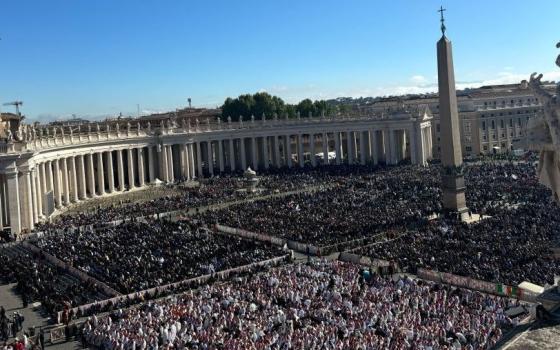We tend to think that the trial of Jesus happened only at the end of his life, before the rulers of the people, Pilate and Herod. In reality, Jesus was on trial for the entirety of his earthly mission. Every time he did or said something, it raised implicit questions, like, "Who does he think he is?" and "Is this the one to come?" Response to those questions depended on two basic sources for discernment: the religious tradition of Israel and the openness of each individual to accept or reject the challenge of Jesus' person and message.
 Just as today, in the days of John the Baptist the scriptural tradition could be read in multiple ways. Then as now, there was a strong temptation to choose texts to prove one's own point of view. John had appeared on the scene as an apocalyptic preacher who predicted that the one to come would arrive with axe and torch in hand to cut down and burn the rotten wood of Israel.
Just as today, in the days of John the Baptist the scriptural tradition could be read in multiple ways. Then as now, there was a strong temptation to choose texts to prove one's own point of view. John had appeared on the scene as an apocalyptic preacher who predicted that the one to come would arrive with axe and torch in hand to cut down and burn the rotten wood of Israel.
| Third Sunday of Advent |
| Isaiah 35:1-6a,10 Psalm 146 James 5:7-10 Matthew 11:2-11 |
After John had been arrested for his prophetic activities, his disciples told him how Jesus was going around preaching: unarmed and disarming. It's hard to imagine the faith crisis John was going through. He probably didn't worry too much about his own life; after all, he had known what he was risking when he spoke out against Herod. But he was surely concerned about his mission and message. Was Jesus really the one he had been called to herald? If so, where was the action? Where was the fire?
John sent his disciples to ask Jesus to testify: "Are you the one who is to come, or should we look for another?"
Jesus tended to avoid that sort of question; it was too tied up with each person's definition of a messiah. Turning the question back on them, Jesus told John's disciples to look at what they had seen and heard in his presence: "Judge for yourselves. What kind of activity demonstrates God's presence?"
John had been described as a paragon of austerity. Nobody questioned his integrity, but few, even if they looked forward to the apocalypse he predicted, wanted to live exactly as he did. His lifestyle of fasting and abstinence was harsh, reflecting his concept of God. Jesus, on the other hand, was criticized for eating and drinking, for mixing with all manner of folk. That mirrored his experience of God. Little wonder that John's primary sacrament was a baptism of repentance while Jesus' was a communion feast.
When John's disciples came to Jesus, their ears were still ringing with John's favorite selections from the prophets, phrases like the ones found in Chapter 1 of Isaiah: "An ass knows its master's manger; but Israel does not know her maker ... They have forsaken the Lord! ... Wash yourselves clean!" John preached from a perspective that recognized sin with great clarity.
Jesus, steeped in the same prophets, drew the good news from them. Rather than focus on sin and punishment, he preached and demonstrated God's offer of salvation.
Responding to John's disciples, Jesus gave evidence from his works rather than words. Wherever he encountered people, the result was transformation: The blind saw, the deaf heard, people were restored to the fullness of their humanity in a community of love.
The Third Sunday of Advent is called Gaudete Sunday. It is a time to rejoice in who God is. It would be a good time to listen again to what Pope Francis told us in Evangelii Gaudium. The opening paragraph proclaims: "The joy of the gospel fills the hearts and lives of all who encounter Jesus. Those who accept his offer of salvation are set free from sin, sorrow, inner emptiness and loneliness. With Christ joy is constantly born anew." That might be a modern rendition of the message Jesus gave to John's disciples.
Today's celebration asks us to judge our faith in the light of Jesus' message. What does the salvation we hope to see look like? Are we waiting for the decimation of our evil enemies, or do we long for the transformation of sinners -- including us?
Many in today's world seem ready to offer the first option. It is the general solution offered by prisons, war and every other form of vengeance. The second option is much costlier. It requires real love to hope for the transformative salvation of those who have done us harm, and it requires humble courage to look for our own conversion.
Gaudete Sunday invites us to rejoice in all that is good around us. It challenges us to recognize the presence of God in everything that promotes freedom and communion. The more we participate in Jesus' work of transformation, the more we will understand that we have encountered God with us and need not look for another.
[Mary M. McGlone is a Sister of St. Joseph of Carondelet and a historical theologian currently writing the history of the Sisters of St. Joseph in the United States.]




